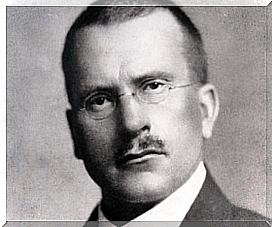5 Grief Phrases To Cope With A Loss

We have all gone through a grieving process at some point. A series of stages which occur one after the other and which allow us to assimilate a loss. However, this process is so painful that sometimes we stop at one of these stages for too long, causing it to take longer than necessary. The grief phrases that we will discover in the rest of this article will enlighten us and give us a little hope if we are going through this painful moment.
On the other hand, the grieving phrases that we will present are not only positive, they also allow us to think about what this process involves and how much we can learn from it. They will also help us to be aware of what to avoid and what to do.
1. There is no mourning like the one that does not speak
This quote from Henry Wardsworth emphasizes the great weight we carry when we do not allow ourselves to express our pain. In the face of loss, we suffer, but certain beliefs and factors can cause us to keep up appearances.

Not crying in public, not expressing our emotions for fear that others will see us are barriers that prevent us from accepting and working through the loss. All this has the consequence of making us bear great pain that lasts over time. Additionally, the burden of not expressing what we are feeling can turn into deep depression.
It is important to allow ourselves to express our feelings. To suppress them is much more detrimental to us.
2. Grieving is a good thing. This is the way through life’s transitions
This is a mourning phrase from Rick Warren that invites us to view this process as an opportunity to say goodbye to this person who has passed away. Sometimes we feel like we haven’t had the chance to do this and grieving allows us to let that person go slowly.
However, this phrase from Warren also invites us to see grief as a preparation for a new stage in our life. A stage in which this person will no longer be physically present, but which does not imply that they disappear from our heart.
Going through grief allows us to say goodbye and transform the relationship we had with that person. Also, it helps us realize that we can keep moving forward.
3. Grieving is a process, not a state
We commented in the introduction that sometimes grief lasts longer than necessary. Therefore, this sentence by Anne Grant emphasizes that grieving is a process and not a state. A series of stages that we must go through, which range from denial to anger, from negotiation to sadness, to finally reach acceptance of the loss. Although the order may not always be the same.

However, many people get stuck in one of these phases. They can coexist with denial for too long, even sadly, for the rest of their lives. This is why Grant’s sentence invites us to open our eyes and realize that mourning is not a state.
Believing that mourning is a condition will keep us from moving forward and being happy. It is important that we can let go of this person who is no longer with us. We have to learn to let go, even if it hurts. It will be truly liberating.
4. The duel challenges us to love once more
This sentence of mourning is offered to us by Terry Tempest Williams, and invites us to see this process as a challenge. Some people who are unable to cope with a loss refuse to love again for fear of losing the other. It is, however, a risk worth taking.
Like all things, everything has its positive side and its negative side. If we didn’t know sadness, we wouldn’t appreciate happiness. Therefore, although we suffer losses throughout our lives, going through the stages of grieving helps us say goodbye and take the risk of loving again.
5. Do not protect yourself from pain with a barrier but rather with your friends
This Czech proverb is very revealing. When we suffer a loss, we sometimes lock ourselves in and separate ourselves from others. We stop meeting our friends, seeing family, socializing, and even doing what we used to love.
It is as if we are putting up a barrier to protect ourselves from the pain we feel, even though what we are actually doing may be to reinforce that pain. It’s good to spend time with ourselves and our pain, but it’s also important to share it and allow others to support us.

When we encounter supporting hands, embracing friends, foreign words comforting us, grieving can be achieved in a healthier way. Isolating ourselves from others can cause our pain to consume us and we won’t know how to let it go.
Have you ever experienced grief? How did you deal with it? These grieving phrases help us be aware of what this process entails and that although our emotions overwhelm us, there is a need to come out afloat. C e appears to be an end is not yet. New starts and new opportunities, or simply, different ways of interacting with people who are gone can sometimes be covered up.










